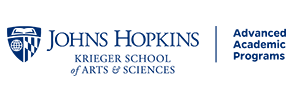Johns Hopkins University MS in Regenerative and Stem Cell Technologies
The Johns Hopkins University (JHU) Krieger School of Arts and Sciences offers an online master of science (MS) in regenerative and stem cell technologies. Students choose four electives from several specialization areas: bioinformatics, epigenetics, human molecular genetics, immunology, personalized medicine, pharmacology, and recombinant DNA.
The regenerative and stem cell technology MS degree is offered 95 percent online with a one-week on-campus lab residency required, during which students collaborate with JHU research faculty and gain hands-on experience in regenerative medicine and stem cell culture laboratory methods. Students will be exposed to recent technological advancements including RNA-seq data, DNA sequencing, and CRISPR. The knowledge gained throughout the program may contribute to developing life-saving medical treatments through stem cell research, gene therapy, and developmental biology.
The MS in regenerative and stem cell technologies program is designed to prepare graduates to be able to manipulate stem cells for disease treatment, apply ethical reasoning to stem cell research and applications, apply current FDA regulations to medical applications of stem cell and biotechnology usage, and assess various methods of regenerative medicine and stem cell technologies and how best to apply them to current medical issues. Graduates of this program may go on to careers in medical or academic research and pharmaceuticals. Job titles may include bioinformatics technician, molecular biologist, geneticist, cellular biologist, Health informatics specialist, biomedical technician, pharmaceutical sciences manager, cancer research scientist, and biomedical engineer.
For the latest academic year, we have 170 schools in our MHAOnline.com database and those that advertise with us are labeled “sponsor”. When you click on a sponsoring school or program, or fill out a form to request information from a sponsoring school, we may earn a commission. View our advertising disclosure for more details.
UNC Wilmington
George Mason University
George Mason University
What to Expect from the JHU Online MS in Regenerative and Stem Cell Technologies
Admission Requirements: Applicants to the online MS in regenerative and stem cell technologies need a bachelor’s degree in science or engineering with a GPA of at least 3.0 on a 4.0 scale. Prerequisites for the program include one semester each of organic chemistry, cell biology, biochemistry, and molecular biology. A 3.0 or higher GPA does not guarantee admission to the program. No work experience or GMAT/GRE is required.
Submission materials include a resume and a statement of purpose sharing long-term goals and reasons for seeking a degree in regenerative and stem cell technologies. Applicants should detail academic and professional strengths and other information that may add to the strength of their application.
Study Plan: The MS program begins in the fall, spring, or summer and can be completed in 12 to 36 months. Both part-time and full-time plans are available. Students come to the Baltimore, Maryland JHU campus for a one-week residency in research. The online program is equivalent to the on-campus program, and students can expect the same rigorous coursework throughout the program.
Curriculum: The MS in regenerative and stem cell technologies comprises 40 credits. Core courses include developmental biology; gene therapy; regenerative medicine: from bench to bedside; ethics in emerging bioscience technologies; stem cell biology; and stem cell culture laboratory methods.
Students then choose four elective courses from the following categories: bioinformatics, epigenetics, human molecular genetics, immunology, personalized medicine, pharmacology, and recombinant DNA. There are more than 100 courses available such as cellular signal transduction; epigenetics, gene organization, and expression; principles of immunology; human molecular genetics; introduction to bioinformatics; molecular basis of pharmacology; clinical and molecular diagnostics; bioinformatics: tools for genome analysis; biostatistics; advanced recombinant DNA lab; cell culture techniques; cancer genomics; and genomic and personalized medicine.
Online Experience: JHU delivers regenerative and stem cell technology courses online through the Blackboard learning management system (LMS). Classes are mostly asynchronous, with synchronous meetings recorded for future viewing. Courses may include readings, videos, lectures, assignments, and assessments.
Faculty and peer interaction occurs through discussion boards, online chats, virtual meeting groups, and during the campus residency. Faculty are closely involved in student learning, monitoring lessons, making suggestions for improvement, and offering virtual office hours for face-to-face help. Course content may be delivered through online resources, including streaming video, PowerPoint presentations, text notes, and web conferencing. Online students can access various student services including academic advising, financial aid support, career services, mental health services, online tutoring, and technical support.
On-Site Requirements: There is a one-week campus residency in Baltimore Marland for the MS in regenerative and stem cell technologies. Students are welcome to visit campus and participate in online groups and graduation.
Paying for the JHU Online MS in Regenerative and Stem Cell Technologies
JHU Online MS in Regenerative and Stem Cell Technologies program tuition is listed in the tables below. Interested professionals can contact the JHU Krieger School of Arts and Sciences admissions department for full-cost information. Travel expenses are not included in the tuition and fees.
Graduate students enrolled at least half-time which is 4.5 credits per term may be eligible for federal grants and loans by applying through the FAFSA. Financial contributions may also be available through employer tuition reimbursement programs, discounts, private loans, and outside scholarships and grants. Students may also seek tuition support or monthly stipends from the health academic department. Prospective students may find out more by contacting the JHU Financial Aid Office.
Johns Hopkins University - Advanced Academic Programs MS in Regenerative and Stem Cell Technologies
For the latest academic year, we have 170 schools in our MHAOnline.com database and those that advertise with us are labeled “sponsor”. When you click on a sponsoring school or program, or fill out a form to request information from a sponsoring school, we may earn a commission. View our advertising disclosure for more details.
- Delve deeply into topics such as gene therapy, regenerative medicine, stem cell biology, bioscience ethics, and stem cell lab methods
- Choose four electives that can focus in seven specialization areas
- Learn about the latest biotechnology discoveries including DNA sequencing, RNA-seq data, and CRISPR
| Degree Level | Master's Degree |
| Program Start Dates | Fall, Spring, Summer |
| Credits Needed to Graduate | 40 |
| Time to Complete? | Graduate in 12 to 36 months |
| 100% Online? | No, a 1-week on-site lab residency is required |
| Program Accreditation | None |
| Level of Education Required? | Bachelor's degree or higher |
| GRE or GMAT Required? | No GMAT/GRE required |
| Work Experience Required? | No work experience required |
| Credit Hours | 40 |
| Average Cost Per Credit | $1,455.00 |
| Estimated Program Tuition * | $58,200.00 |
Tuition is calculated based on credits, at the published tuition rate. For programs with variable tuition rates, we use the rates for part-time students. Tuition number represents the cost of tuition for the entire program, not per semester or year. Estimated total tuition does not include additional fees, unless otherwise specified. Please check here for any tuition updates.


